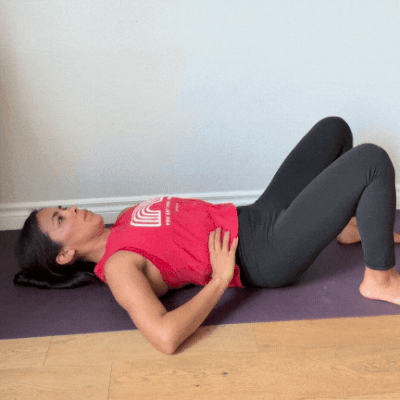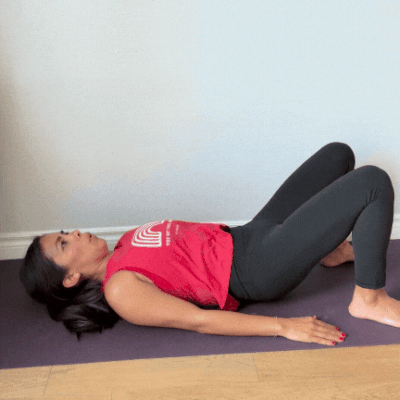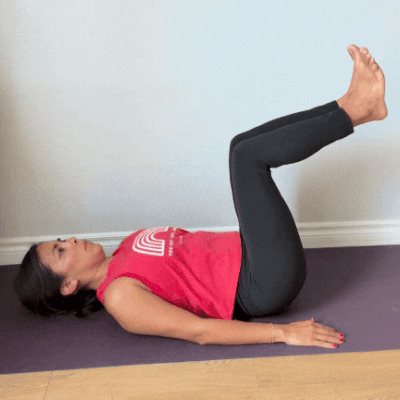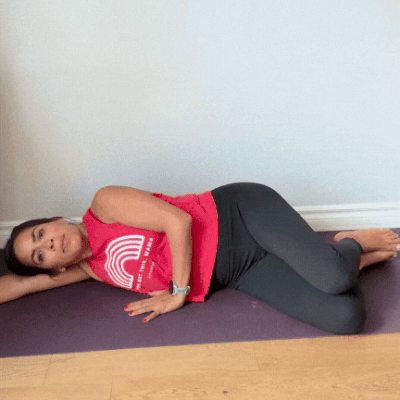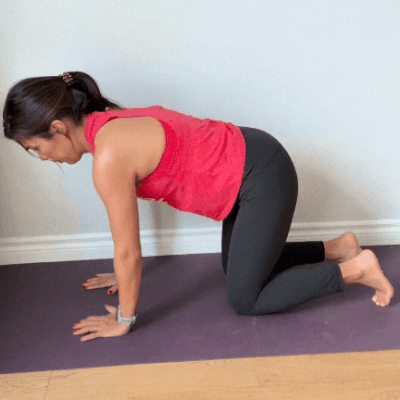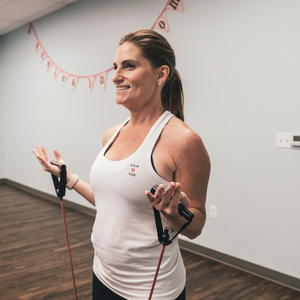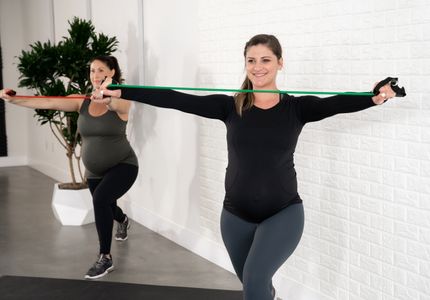
Training By Trimester: 4th Trimester
FIT4MOM x Jessica Maurer
Just like with every pregnancy, each 4th Trimester is unique. The 4th Trimester is the time between birth and being medically cleared for movement by your doctor. The 4th Trimester can last from six weeks up to three months. It fluctuates not based on how in shape you were before birth but on your ability to heal, rest, and recover.
Additionally, the six weeks after birth is the most intense for moms. Focus on keeping yourself and your baby healthy instead of worrying about returning to your fitness routine. You need to start slowly and listen to your body. You should approach movement in your 4th Trimester as a place of no judgment or comparison, just awareness. This experience is yours and yours alone! Every single pregnancy and birth is different, and everyone’s body will heal and recover differently. Celebrate this and honor it.
Life after the baby looks very different than life before the baby. If your workouts used to happen daily for an hour at a time, you’ll need to re-learn that everything counts, especially during the first few months. The goal of exercise during this time should be overall well-being, not your waistline. Movement should make you feel better, give you a chance to take a break from caring for the baby, and a time to connect to others. Every step counts.
You will probably hear this from everyone, but it can be hard to remember: This time is fleeting. Your baby will never be a newborn again! Getting back into shape will come. You should enjoy this time with the new baby - you have a lifetime to work out.
Let's dive into our Start, Stop, and Continue for fitness in the 4th Trimester—just as we did for 1st, 2nd, and 3rd Trimesters.
START
The American College of Obstetricians and Gynecologists, ACOG, recommends starting gentle movements for new moms because:
It boosts energy levels.
It promotes better sleep.
It relieves stress and helps regulate emotions.
It may be useful in preventing postpartum depression.
While some moms may be eager to resume their fitness routine, we want to emphasize the importance of taking it slow. Walking is an excellent way to reintroduce movement into your daily life, whether strolling around the house or walking up and down the street. Walk with friends, family, and neighbors; this social support is crucial during this trimester. You can walk with a stroller, baby-wearing, or alone if you have a trusted companion or partner to watch the baby.
These walks should not focus on time, power walking, or intensity. Instead, they gently remind the body of its natural ability to take one step after another. Your goal is to move forward physically and mentally at a comfortable pace.
If you’re able to walk outside, you'll also benefit from receiving vitamin D, which can boost your immunity and lift your endorphins. However, walking indoors around the house, especially while the baby is napping, is equally important during the fourth trimester.
Recent postpartum women should prioritize reconnecting with their breath because it offers numerous physical and emotional benefits during the postpartum period. Pregnancy and childbirth can lead to changes in breathing patterns and diaphragmatic function, making it essential to re-establish proper breathing techniques. Focusing on conscious and deep breathing can help reduce stress, anxiety, and postpartum depression, promoting emotional well-being. Moreover, deep breathing aids in core and pelvic floor muscle activation, supporting the recovery of these essential areas after childbirth. By reconnecting with breath, you can improve your body's healing process, regain strength, and enhance overall relaxation and mindfulness, fostering a healthier and more balanced postpartum experience.
Remember, the 4th trimester is a time of recovery and adjustment, so you must be kind to yourself and prioritize your well-being as you navigate this beautiful journey of motherhood.
Not sure where to start? Download our free guide to 4th trimester movement!
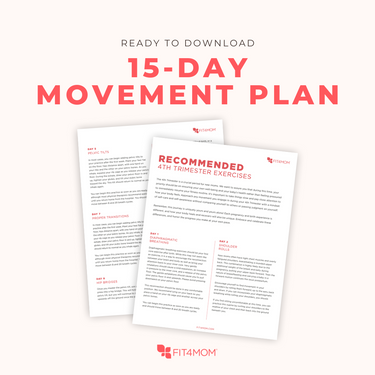
STOP
Stop with any expectations of when you'll return to your previous fitness routines. Whether it was a vaginal or a C-section delivery, if you return to fitness too soon, you risk further damaging your pelvic floor, deepening your DRA, and causing other muscular or postural imbalances. All of these things have long-term negative effects.
After giving birth, the uterus sheds the thick lining that develops during pregnancy, leading to a natural discharge known as lochia. This discharge includes blood, mucus, and tissue, a normal part of the postpartum healing process. New mothers need to be aware of the characteristics of lochia, as it can provide insights into their recovery and overall well-being. Monitoring the amount and color of lochia can offer valuable information about a woman's postpartum healing progress. If the discharge suddenly increases in amount or becomes bright red after tapering off, it might be a sign that you are overexerting yourself and need to prioritize rest to support proper healing.
Certain positions are going to be uncomfortable for you in the 4th Trimester. For example, you should only be in a prone position while transitioning levels and not training there for extended periods. Seated positions may also be uncomfortable based on pelvic floor dysfunctions, hemorrhoids, or perineal tearing. You can aggravate your DRA, C-Section incision, and sensitive breasts by putting stress and weight on the front side of the body. Additionally, relaxin is still present in the body after delivery and can affect joint stability, potentially making certain positions less comfortable.
Let go of your assumptions of bouncing back and turn your focus to overall wellness—nutrition, hydration, rest, and intuitive movement.
CONTINUE
During the 4th Trimester, rest is paramount. This period represents a time of transition, where the demands of caring for a newborn can be overwhelming. You should prioritize self-care and allow yourself the space, grace, and time needed for recovery.
This might involve getting as much sleep as possible, accepting help from friends and family, and recognizing that feeling physically and emotionally drained during this phase is perfectly normal. Rest is not a luxury but a necessity, as adequate rest can play a pivotal role in the healing process, promote emotional well-being, and contribute to the ability to care for the newborn effectively.
As for returning to fitness, it's important to remember that there's no universal timeline for this. Every woman's body is different, and recovery from childbirth varies from person to person. The emphasis should be on listening to your body and seeking guidance from healthcare professionals. You may feel ready to engage in light physical activities like walking or gentle stretching relatively soon after giving birth, or you may need more time. The key is not to rush the process but to gradually rebuild strength and stamina at a comfortable and safe pace. It's essential to be patient and prioritize overall well-being over external pressures to "bounce back" quickly.
READY TO GET MOVING?
Check out these 4th trimester safe exercises—perfect for prepping your body for returning to exercise!
Diaphragmatic Breathing
Diaphragmatic breathing is an effective way to support postpartum recovery, particularly in rebuilding core strength, promoting relaxation, and managing stress. Start by lying down on your back with your knees bent and feet flat on the floor. Place your hands around your lower rib cage. Inhale through your nose to expand your rib cage in all directions and feel your abdomen pushing it into your hands and your pelvic floor relax. Exhale slowly and gently allowing your abdomen back to its starting position and feeling your pelvic floor contract.
Hip Bridges
Bridges are a great strengthening exercise for your core, hamstrings, and glutes when done correctly. Avoid arching your back as you press your hips (pelvic and pubic bones) upward. Focus more on lifting your tailbone to the sky, not your rib cage which should stay zipped together. Once at the top, think about squeezing your pelvic floor inward and upwards. Roll down to full release.
Heel Taps
Heel taps help rebuild stability and improve pelvic floor function. Begin by lying on your back with your knees bent to 90 degrees in the table top position and your arms relaxed by your sides. Make sure your lower back is gently pressing into the floor throughout the exercise to ensure your core is engaged right from the start. Slowly lower your one heel toward the floor and tap it on the ground. Focus on keeping your core engaged and your lower back in contact with the floor. Then, bring your leg back up to the starting position. Repeat with the other leg.
Side Lying Clamshell
The side-lying clamshell is a great exercise to strengthen the glutes, hips, and pelvic floor while avoiding excessive strain on the core and back. Begin by lying on your side with your legs stacked on top of each other. Your head should be supported by a pillow or your arm, ensuring your neck stays in a neutral position. Bend your knees, keeping your feet together. Your body should form a straight line from your head to your tailbone. Keeping your feet together, slowly open your top knee like a clamshell, lifting it toward the ceiling. Make sure to move only the top leg while keeping your feet in contact with each other. Slowly lower your knee back down to the starting position, keeping the movement controlled. Be sure to complete the exercise on each side.
Cat Cow
Cat Cow is beneficial for postpartum moms as it can aid in rebuilding flexibility, realigning the spine, and strengthening the core. Begin by positioning yourself on your hands and knees, ensuring that your wrists are directly under your shoulders and your knees are directly under your hips. Spread your fingers wide for stability and press through your palms. As you inhale, slowly drop your belly toward the floor, lifting your chest and tailbone up toward the ceiling. Allow your back to gently arch, opening up your chest and stretching the front of your body. Look up or forward to lengthen through your neck. As you exhale, gently round your back toward the ceiling. Tuck your tailbone and drop your head toward the floor, letting your chin gently come toward your chest. Continue to move between the Cat and Cow positions, linking your breath to your movements.
Bird Dog
Bird dog is an excellent exercise requiring the body to stabilize the core while moving the upper and lower extremities. Remember to only lift the arm and leg as high as you can without letting the lower back drop-down or sway and reach toward the walls in front of and behind you. If you have a known severe DRA, focus on core contractions in quadruped without any additional movements & see a pelvic floor therapist.
Do you want more information and guidance? Motherhood is a transformative journey filled with joy, challenges, and the need for incredible strength. Since 2001, FIT4MOM has been the leader of prenatal and postnatal fitness, supporting moms nationwide through our network of franchise owners and dedicated instructors. To further support our mission of helping all moms find their Strength in Motherhood®, we are thrilled to announce our first-ever certification course available to all fitness professionals: FIT4MOM’s Prenatal & Postnatal Fitness Certification.
Let's empower moms to find their Strength in Motherhood® and unlock their full potential for everyday life as a new parent. Motherhood is an extraordinary experience; with FIT4MOM, you can make it even more empowering for your clients.
WANT MORE, MAMA?
Other blogs about pregnancy you'll enjoy:


